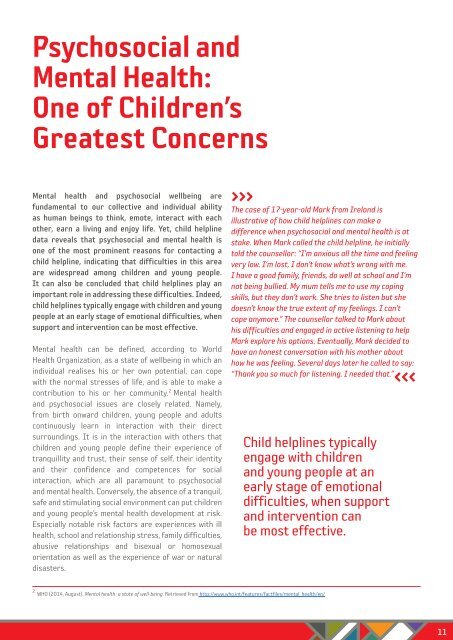The Voices of Children and Young People
FjLR300hYsM
FjLR300hYsM
Create successful ePaper yourself
Turn your PDF publications into a flip-book with our unique Google optimized e-Paper software.
Psychosocial <strong>and</strong><br />
Mental Health:<br />
One <strong>of</strong> <strong>Children</strong>’s<br />
Greatest Concerns<br />
Mental health <strong>and</strong> psychosocial wellbeing are<br />
fundamental to our collective <strong>and</strong> individual ability<br />
as human beings to think, emote, interact with each<br />
other, earn a living <strong>and</strong> enjoy life. Yet, child helpline<br />
data reveals that psychosocial <strong>and</strong> mental health is<br />
one <strong>of</strong> the most prominent reasons for contacting a<br />
child helpline, indicating that difficulties in this area<br />
are widespread among children <strong>and</strong> young people.<br />
It can also be concluded that child helplines play an<br />
important role in addressing these difficulties. Indeed,<br />
child helplines typically engage with children <strong>and</strong> young<br />
people at an early stage <strong>of</strong> emotional difficulties, when<br />
support <strong>and</strong> intervention can be most effective.<br />
Mental health can be defined, according to World<br />
Health Organization, as a state <strong>of</strong> wellbeing in which an<br />
individual realises his or her own potential, can cope<br />
with the normal stresses <strong>of</strong> life, <strong>and</strong> is able to make a<br />
contribution to his or her community. 2 Mental health<br />
<strong>and</strong> psychosocial issues are closely related. Namely,<br />
from birth onward children, young people <strong>and</strong> adults<br />
continuously learn in interaction with their direct<br />
surroundings. It is in the interaction with others that<br />
children <strong>and</strong> young people define their experience <strong>of</strong><br />
tranquillity <strong>and</strong> trust, their sense <strong>of</strong> self, their identity<br />
<strong>and</strong> their confidence <strong>and</strong> competences for social<br />
interaction, which are all paramount to psychosocial<br />
<strong>and</strong> mental health. Conversely, the absence <strong>of</strong> a tranquil,<br />
safe <strong>and</strong> stimulating social environment can put children<br />
<strong>and</strong> young people’s mental health development at risk.<br />
Especially notable risk factors are experiences with ill<br />
health, school <strong>and</strong> relationship stress, family difficulties,<br />
abusive relationships <strong>and</strong> bisexual or homosexual<br />
orientation as well as the experience <strong>of</strong> war or natural<br />
disasters.<br />
<strong>The</strong> case <strong>of</strong> 17-year-old Mark from Irel<strong>and</strong> is<br />
illustrative <strong>of</strong> how child helplines can make a<br />
difference when psychosocial <strong>and</strong> mental health is at<br />
stake. When Mark called the child helpline, he initially<br />
told the counsellor: “I’m anxious all the time <strong>and</strong> feeling<br />
very low. I’m lost, I don’t know what’s wrong with me.<br />
I have a good family, friends, do well at school <strong>and</strong> I’m<br />
not being bullied. My mum tells me to use my coping<br />
skills, but they don’t work. She tries to listen but she<br />
doesn’t know the true extent <strong>of</strong> my feelings. I can’t<br />
cope anymore.” <strong>The</strong> counsellor talked to Mark about<br />
his difficulties <strong>and</strong> engaged in active listening to help<br />
Mark explore his options. Eventually, Mark decided to<br />
have an honest conversation with his mother about<br />
how he was feeling. Several days later he called to say:<br />
“Thank you so much for listening. I needed that.”<br />
Child helplines typically<br />
engage with children<br />
<strong>and</strong> young people at an<br />
early stage <strong>of</strong> emotional<br />
difficulties, when support<br />
<strong>and</strong> intervention can<br />
be most effective.<br />
2 WHO (2014, August). Mental health: a state <strong>of</strong> well-being. Retrieved from http://www.who.int/features/factfiles/mental_health/en/<br />
11


